Watermelon, a beloved fruit of the summer season, is cherished for its hydrating and refreshing juiciness. For rabbit owners, it’s natural to wonder, can rabbits eat watermelon?
This guide provides a comprehensive look into whether watermelon is a suitable treat for rabbits, how to serve it safely, and what parts of the fruit are appropriate for them.
With expert insights and practical tips, this article ensures that rabbit owners make informed choices about adding watermelon to their pets’ diets.
Key Takeaways
- Rabbits can eat watermelon, but it should be an occasional treat due to its high sugar content.
- Moderation is crucial: Offer only small, bite-sized portions of watermelon once or twice a week to avoid digestive issues.
- Preparation matters: Always remove seeds and cut the watermelon into manageable pieces; seeds can pose choking hazards.
- Safe parts of watermelon for rabbits include the red flesh and the white part of the rind; avoid the green outer skin, leaves, and plants.
- Different types of watermelon (red, yellow, white rind) are generally safe in small quantities, but fresh watermelon is the preferred choice.
- Avoid frozen watermelon: It can be too hard and potentially harmful to rabbits’ teeth and digestive systems.
Can Rabbits Eat Watermelon?
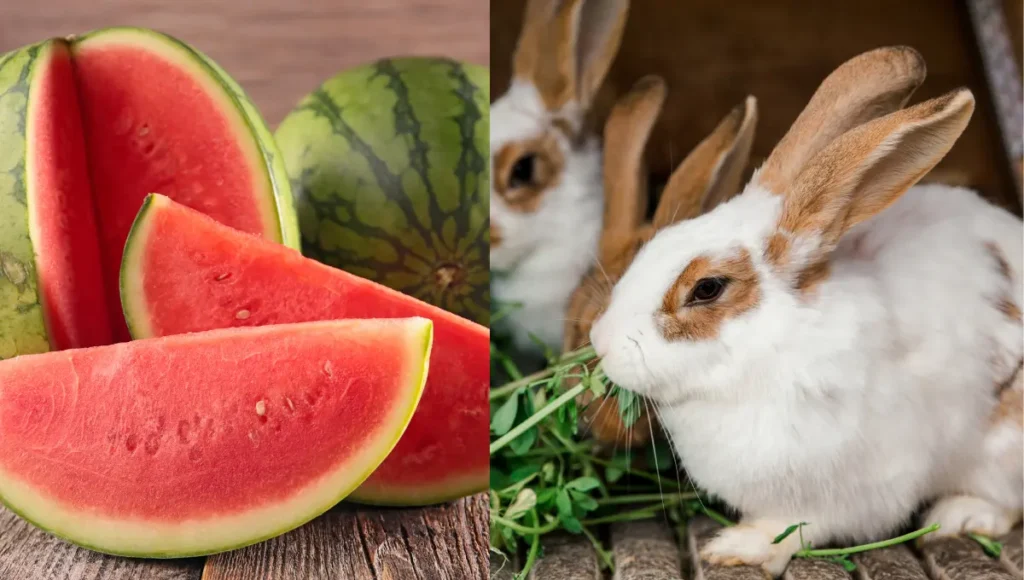
Rabbits can indeed eat watermelon, but it should be treated as an occasional snack rather than a regular part of their diet. Watermelon offers hydration benefits due to its high water content, making it a refreshing treat, especially in warmer weather.
However, it is also high in sugar, which is not ideal for a rabbit’s digestive system. Rabbits have sensitive digestive tracts that are adapted primarily to digest high-fiber foods like hay and leafy greens.
Introducing too much fruit, including watermelon, can disrupt this balance and lead to gastrointestinal problems.
Watermelon can be a good source of vitamins A and C, which are beneficial for a rabbit’s immune system.
Yet, the primary concern remains the sugar content, which can contribute to obesity and other health issues if fed in large amounts.
Thus, while watermelon can be a part of a rabbit’s diet, it must be given in moderation.
Nutritional Value of Watermelon for Rabbits (Per 100g)
| Nutrient | Amount (Per 100g) | Benefits for Rabbits | Considerations |
| Water | 91.45 g | Hydrates rabbits, especially in hot weather | Excessive consumption, due to its high water content, may cause loose stools. |
| Calories | 30 kcal | Low in calories, good for the occasional treat | Should be limited due to sugar content |
| Carbohydrates | 7.55 g | Provides quick energy | High sugar content; limit to avoid obesity and digestive issues |
| Sugars | 6.2 g | The sweet flavor that rabbits enjoy | Excessive sugar can cause dental and digestive problems |
| Fiber | 0.4 g | Minimal fiber content | Rabbits need high-fiber foods like hay; watermelon lacks sufficient fiber |
| Protein | 0.6 g | Minimal protein | Rabbits require protein from other sources like leafy greens |
| Vitamin A | 569 IU | Supports eye health and immune function | Not a primary source; rabbits get Vitamin A from leafy greens |
| Vitamin C | 8.1 mg | Antioxidant properties support immune health | Rabbits produce their own Vitamin C; not a critical need from the diet |
| Potassium | 112 mg | Supports heart and muscle function | Beneficial in small amounts; a balanced diet provides sufficient potassium |
| Magnesium | 10 mg | Helps with bone health and metabolism | Rabbits require a varied diet to meet mineral needs |
This table highlights the nutritional profile of watermelon and how it can benefit or impact a rabbit’s diet. While watermelon can provide hydration and some vitamins, it lacks the fiber and low sugar content that are ideal for a rabbit’s digestive system.
How to Serve Watermelon to Rabbits
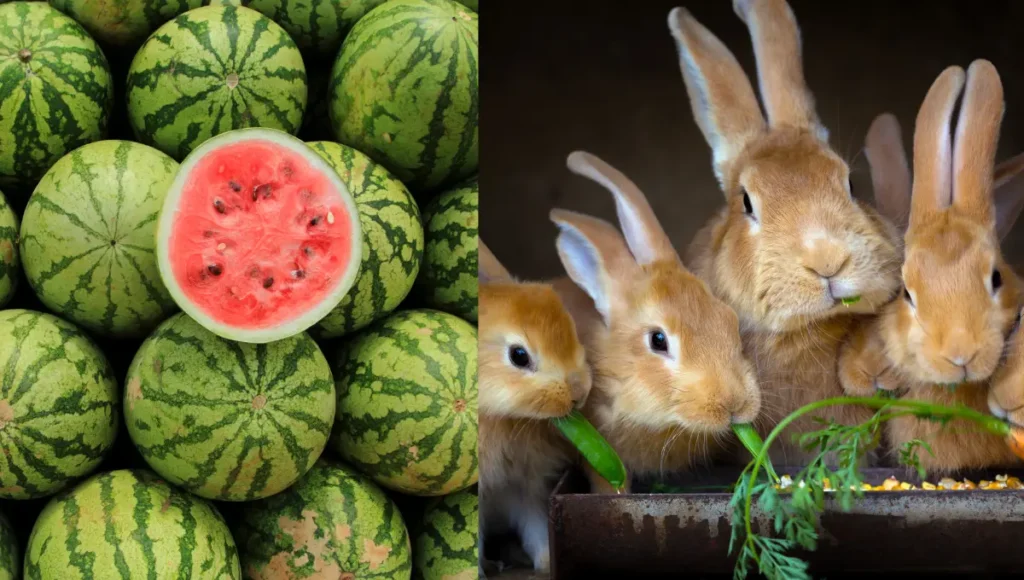
Proper Serving Sizes
When serving watermelon to rabbits, it’s crucial to keep the portions small. A small, bite-sized cube of watermelon is sufficient for a rabbit. This amount ensures that they enjoy the treat without consuming too much sugar.
Watermelon should be offered no more than once or twice a week to prevent overconsumption of sugar.
Preparation Tips
Before serving watermelon to a rabbit, it is essential to prepare it properly:
- Thoroughly wash the watermelon to eliminate any lingering pesticides or chemicals.
- Remove all the seeds and slice the watermelon into small, easy-to-eat pieces.
- Avoid giving any part of the watermelon that is hard or difficult for the rabbit to chew.
These preparation steps help ensure that the watermelon is safe and enjoyable for the rabbit.
Do Rabbits Like Watermelon?
Many rabbits enjoy watermelon due to its sweet and juicy nature. Rabbits are naturally drawn to sweeter foods, and the high water content in watermelon can be particularly appealing.
However, just like humans, individual preferences vary. Some rabbits may love watermelon, while others might not show any interest.
To determine if a rabbit likes watermelon, offer a small piece and observe its reaction. If the rabbit eagerly eats the watermelon and seems to enjoy it, it’s safe to assume it likes it.
On the other hand, if the rabbit ignores the watermelon or only nibbles at it without enthusiasm, it may not be a preferred treat.
What Part of Watermelon Can Rabbits Eat?
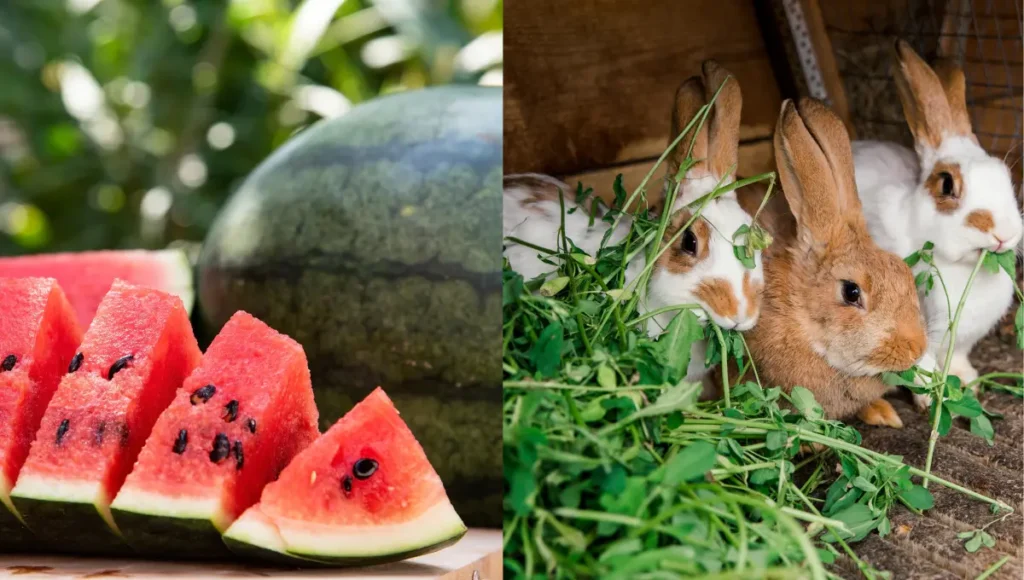
Rabbits can consume certain parts of the watermelon, but not all are equally safe or beneficial.
Flesh
The flesh of the watermelon is the safest and most enjoyable part for rabbits to eat. It’s juicy, easy to chew, and relatively low in calories. However, because it is high in sugar, it should still be offered in moderation.
Can Rabbits Eat Watermelon Seeds?
No, rabbits should not eat watermelon seeds. Swallowing the seeds can be a choking hazard and may lead to digestive problems. It is best to remove all seeds before offering watermelon to a rabbit.
Can Rabbits Eat Watermelon Skins?
Rabbits can eat watermelon rind, but only the white part. The outer green skin is tough and can be difficult for rabbits to digest. The white part of the rind is lower in sugar than the flesh and can offer some fiber, making it a relatively healthier option in small quantities.
Can Rabbits Eat Watermelon Leaves?
While watermelon leaves are not toxic to rabbits, they are not a typical part of a rabbit’s diet and are generally not recommended. Leaves may contain pesticides or chemicals if the watermelon has been grown with agricultural treatments.
Can Rabbits Eat Watermelon Plants?
Feeding watermelon plants to rabbits is not advisable. Like leaves, the plants could carry chemicals that are harmful to rabbits. It is best to stick to the fruit’s safe parts, like the flesh and the inner white rind.
Safe Watermelon Parts for Rabbits
| Watermelon Part | Safe for Rabbits? | Notes |
| Red Flesh | Yes | In moderation, due to high sugar content |
| White Rind | Yes | Low in sugar, high in fiber; serve sparingly |
| Seeds | No | It can cause choking and digestive problems |
| Green Skin | No | Difficult to digest, may cause discomfort |
| Leaves | No | Potential exposure to chemicals is not ideal |
| Plants | No | Not recommended, potential chemical residue |
What Types of Watermelon Do Rabbits Eat?
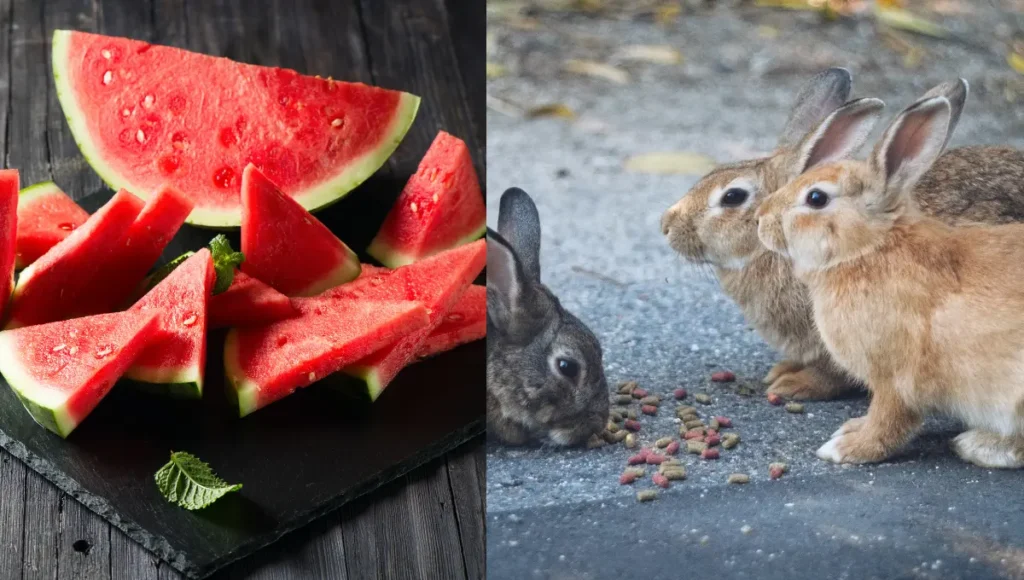
Rabbits can technically eat different types of watermelon, but some are better suited for them than others.
Can Rabbits Eat White Watermelon?
White watermelon, which refers to the less ripe, inner part of the rind, is safe for rabbits in small amounts. It contains less sugar than the red flesh, making it a healthier choice as an occasional snack.
Can Rabbits Eat Yellow Watermelon?
Yellow watermelon, like the more common red variety, is safe for rabbits in moderation. It has a slightly different taste but a similar nutritional content. Again, moderation is key due to its sugar content.
Can Rabbits Eat Frozen Watermelon?
Feeding frozen watermelon to rabbits is not recommended. While it might seem like a refreshing treat, frozen foods can be too hard for rabbits to chew and might cause dental issues or digestive upset. It’s best to stick to fresh or slightly chilled watermelon for a cooling snack.
Can Rabbits Eat Fresh Watermelon?
Yes, fresh watermelon is the best option for rabbits. Fresh watermelon retains all its hydrating properties and is easy for rabbits to chew and digest. Always ensure it is served in small portions and that all seeds have been removed to prevent choking.
Conclusion
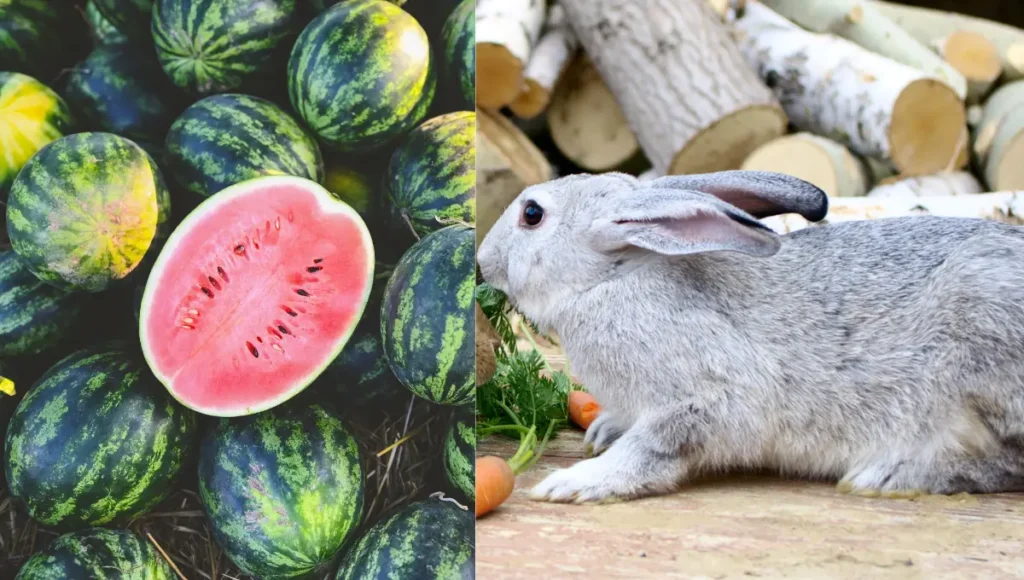
So, can rabbits eat watermelon? Yes, they can, but with caution. Watermelon can be a delightful, hydrating treat for rabbits when offered in moderation.
It is crucial to prepare it correctly, avoiding seeds and hard parts, and to keep portions small to prevent digestive issues.
Always prioritize a balanced diet primarily consisting of hay and vegetables, with watermelon as an occasional treat. For any dietary changes or concerns, consulting a veterinarian is always the best course of action.
FAQs
Can rabbits eat watermelon every day?
No, rabbits should not eat watermelon every day. Watermelon is high in sugar, which can lead to digestive issues and obesity if consumed too frequently. It should only be given as an occasional treat, no more than once or twice a week.
Is watermelon rind safe for rabbits?
Yes, the white part of the watermelon rind is safe for rabbits in small amounts. However, the tough green outer skin should be avoided as it can be difficult for rabbits to digest and may cause discomfort.
Can baby rabbits eat watermelon?
It’s best to avoid giving watermelon to baby rabbits. Their digestive systems are more sensitive than adult rabbits, and introducing sugary fruits too early can cause digestive problems. Stick to a diet primarily of hay and specially formulated pellets until they are older.
What should I do if my rabbit eats watermelon seeds?
If your rabbit accidentally eats watermelon seeds, monitor them closely for any signs of discomfort or digestive issues, such as reduced appetite or unusual stool. If you notice any concerning symptoms, consult a veterinarian immediately.
Are there any other fruits similar to watermelon that are safe for rabbits?
Yes, other fruits like apples (without seeds), berries, and pears can be given to rabbits in moderation. Like watermelon, these fruits are high in sugar and should only be served occasionally as a treat. Always remove any seeds and cut the fruit into small, manageable pieces.

Pingback: Can Rabbits Eat Tomatoes? A Complete Guide for Owners